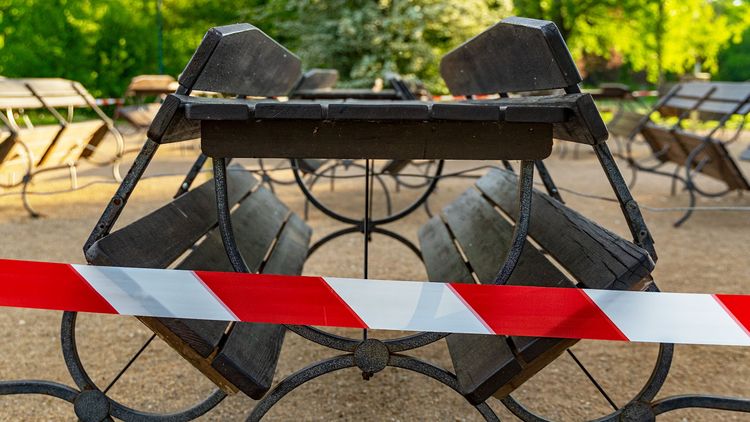Why we are already writing the history of the Covid pandemic: an article by historian Malte Thießen.
Covid still has us firmly in its grip. The fourth wave, the thousands of people suffering from the effects of long Covid, and many deaths per day are making us painfully aware of the pandemic's continuing presence. But historians are already tracing the history of the pandemic, and while the first assessments in autumn 2020 were overtaken by the second wave, the time has now come for an interim appraisal.
But is this really a good idea – a history of Covid in real time? How can we recount the history of an event that affects us all, and for which there is still no end in sight? Is it not too early to write a history of the Covid pandemic? This is indeed a bold undertaking for the discipline. Nevertheless, I am convinced that this experiment will give us new insights into the pandemic and at the same time help us to preserve the experiences of 2020 and 2021 for the future.
Against forgetting
The early history of the pandemic is in the process of being forgotten. The panic buying of spring 2020 that stood for the eruption of archaic fears is no longer an issue today. Does anyone still remember how certain groups were stigmatized as "carriers of diseases"? Well into the summer of 2020, acts of exclusion more typical of primitive times could be observed in the middle of Germany. Chinese and Italian-looking people were branded as "Corona-Körper" (Covid bodies), insulted, and expelled from trains, buses and buildings.
The applause for caregivers and medical staff is also mostly a thing of the past today, not to mention the criticism of the glaring social inequalities exposed by Covid. Everyone was most definitely not equal in the pandemic. On the contrary, the risk of infection was higher for women, for the poorer sections of the population and for the less educated. Yet the demands for a thorough reform of our healthcare system that were once so loud have now faded into silence.
Dangerous carelessness
The history of Covid thus holds up a mirror to our society. It shows us that it is not viruses that are the problem, but people. It is not viruses that spread, but the social behaviours and social conditions that facilitate infection. The message of the Covid story is this: We are the pandemic. If we want to understand Covid, we must examine the social structures at all levels – from foreign policy to our daily lives. The history of Covid is therefore also an appeal for us to reflect on the role we play in the pandemic, so that the debates on containment measures can be more objective.
An historical analysis of Covid also investigates the roots of our present times, helping us to understand why we initially slid so unconcernedly into this pandemic. Germans had lived in the age of immunity since the 1970s, and had come to view infectious diseases as relics of the past – as a problem that only affected "others", in Asia or Africa for example. Although experts had been warning of a return of pandemics for some time, and the ministries had their emergency plans at the ready, when Covid first struck we were not prepared. We had forgotten how to live with pandemics. Our lack of concern was based on major advances in the development of vaccines and antibiotics and was therefore a sign of progress. But at the same time, it made us deaf to the warnings of looming threats.
The history of Covid is therefore also an appeal to societies to view pandemics not as a crisis, but as a normal state of affairs. We got off lightly with the swine flu in 2009, with the Ebola outbreaks, and during the first Sars pandemic of 2002/03. However, hundreds of thousands of people are still contracting HIV, and more than 90,000 Germans have to live with AIDS today. For our grandparents, tuberculosis, diphtheria and measles were ever-present threats, and the term "childhood diseases" was not a trivialization but rather a bitter euphemism for illnesses that still had very high infant mortality rates in the 20th century.
A history of progress
But the history of Covid also offers some comforting aspects. The vaccination programme, for instance, represents an unprecedented collective effort. Never before have two-thirds of Germany's entire population been vaccinated against an infectious disease within such a short time. As much as we worry today about vaccination rates being too low, the enormous innovative power of global science to quickly provide vaccines is very reassuring.
Even our fear of Covid is essentially progress, as a final glance back at the history of epidemics shows. In 1969/70, the Hong Kong flu raged across the globe and claimed up to 50,000 lives in West Germany alone. The Germans' response, however, was relatively mild because the Hong Kong flu mainly affected the elderly and people with underlying medical conditions, and that was considered reassuring at the time. The Germans had learned to live with deaths among those belonging to high-risk groups.
The situation is very different today. Most of us were willing to accept lockdowns and heavy restrictions during the pandemic because we wanted to protect the old and the sick. Their deaths were no longer perceived as collateral damage, but as a crisis that affected everyone. The history of Covid thus also testifies to changes in our risk perception in the 21st century, and therefore to comprehensive social change. It also thus testifies to advances for which we would otherwise never have asked.
This text was first published in the October issue of the university magazine UNI-INFO (in German).




